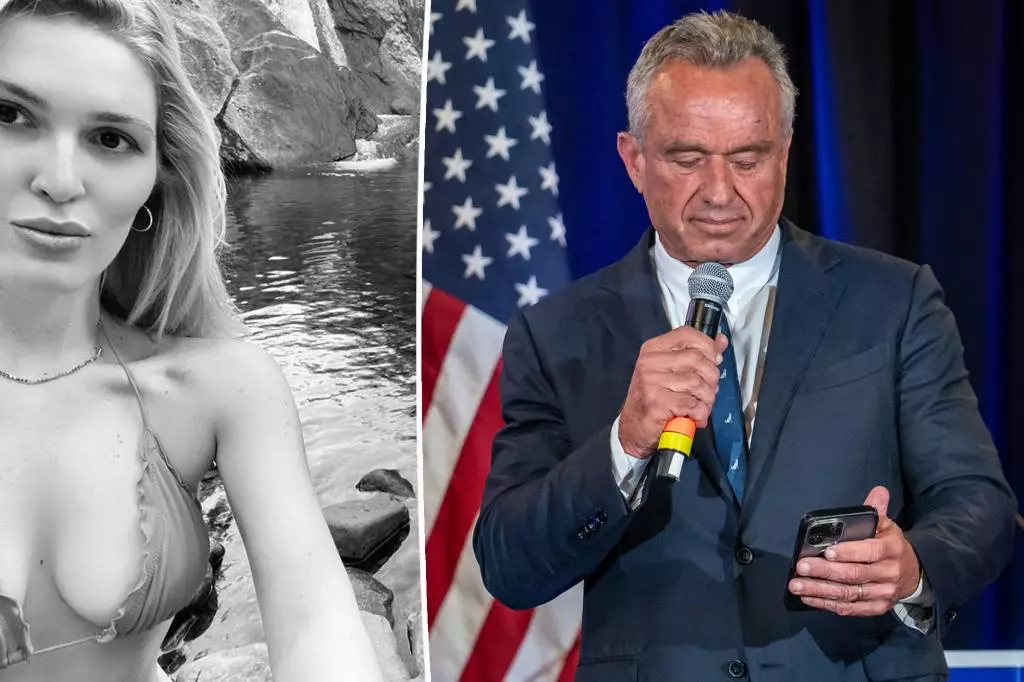In an age where celebrity relationships often unfold in the public eye with all their messy intricacies, the tumultuous affair between Robert F. Kennedy Jr. and journalist Olivia Nuzzi has captivated media outlets and the public alike. What appeared at first to be a mere flirtation has since been revealed as an entangled relationship marked by secrecy, emotional manipulation, and a profound risk to Nuzzi’s career.
Their relationship reportedly began in October when Nuzzi found herself repulsed by an awkward advance from Kennedy. Such a reaction is hardly uncommon, particularly in high-profile dynamics where power imbalances can lead to uncomfortable encounters. However, as their communication transitioned from casual interactions to intense exchanges via text messages, the narrative took a surprising turn. Kennedy’s strategy of “love bombing”—a manipulative tactic aimed at overwhelming someone with affection—appeared to work, quickly ensnaring Nuzzi in a whirlwind of feelings. This exemplifies how emotional entanglement can blossom even from the least promising beginnings, stirring feelings that may have remained dormant or buried.
For nearly a year, Nuzzi reportedly maintained a façade, navigating her emotional involvement with Kennedy while still committed to her partner of nearly a decade, Politico journalist Ryan Lizza. The notion of living a double life poses numerous psychological challenges, as it breeds conflict between one’s emotional desires and moral responsibilities. It raises questions about identity, loyalty, and the effects of the pressure to fulfill societal norms while being drawn toward forbidden allure. Nuzzi’s predicament underscores the complexities that often accompany romantic entanglements involving influential figures.
After the initial interview assignment, where Kennedy supposedly made an overt romantic gesture during a secluded hike, Nuzzi realized the potential peril of their budding relationship. The tension escalated with Kennedy’s cryptic messages, revealing a sense of urgency that can often accompany secretive affairs. While flirting could be dismissed as harmless, the accompanying feelings of fear and anxiety indicate a toxic quality inherent in their connection. A source revealed that at times, Kennedy’s abrupt communication cutoffs only amplified Nuzzi’s desire to reconnect, showing the all-too-familiar cycle of obsession akin to addictive behavior. Such dynamics often lead to emotional unrest and uncertainty, particularly for those deeply ingrained in the public eye.
The notion that Kennedy wielded control over their interactions reflects a broader theme of manipulation that frequently characterizes asymmetric relationships. Nuzzi’s friends began to express concern over her transformation, hinting at emotional strife and compromised autonomy as she navigated the tempestuous waters of her involvement with Kennedy. This serves as a stark reminder of how charisma, especially from influential personalities, can cloud judgment and lead individuals down a perilous path from which it might prove difficult to extricate themselves.
In a professional sense, Nuzzi’s involvement with Kennedy ultimately put her career in jeopardy. Faced with scrutiny from her employer, her situation raises pertinent questions about journalistic integrity and the ethical boundaries that typically safeguard against perceived bias, particularly during turbulent personal entanglements. Although her relationship with Kennedy was largely kept under wraps, the gradual revelation of their connection culminated in significant professional repercussions, leading to her suspension from New York Magazine. This embodies the relentless scrutiny faced by those who traverse the intersection of journalism and personal relationships with powerful figures—highlighting a precarious balance that may no longer make sense in a world driven by social media and instant gratification.
Nuzzi’s affair with Kennedy, fraught with emotional trials, social ramifications, and professional consequences, serves as a somber reminder of the complexities embedded within human relationships. It calls into question the ethics surrounding boundaries in both personal and professional spheres. Ultimately, their relationship not only raised eyebrows within the corridors of media and politics but also serves as a case study for the interplay between public personas, private passions, and the omnipresent risk that lies in conflating the two. In discerning these dynamics, we can glean invaluable insights into the fundamental human experience—marked by desire, folly, and the inescapable challenges of love.

Leave a Reply